Early Corticosteroid Use and Short-Term Outcomes in Pediatric Bacterial Meningitis: A Nationwide Study in Japan, 2014 to 2022
IF 3.2
3区 医学
Q2 CLINICAL NEUROLOGY
引用次数: 0
Abstract
Background
The benefit of early corticosteroid use in pediatric bacterial meningitis is uncertain, except for its effect on hearing loss caused by Haemophilus influenzae type b (Hib) meningitis. We aimed to evaluate the association between early corticosteroid use and the short-term outcomes amid a background of decreased Hib infection incidence.
Methods
We conducted a retrospective cohort study using data from a nationwide inpatient database in Japan. We identified children younger than 15 years with bacterial meningitis who were discharged between April 2014 and March 2022. The primary outcome was a composite of in-hospital death and neurological sequelae, defined as tracheostomy during hospitalization or disturbed consciousness, mechanical ventilation, tube feeding, or antiepileptic drugs at discharge. The secondary outcome was a recorded diagnosis of hearing loss. Stabilized inverse probability of treatment weighting using propensity scores was performed to compare the outcomes between patients with and without intravenous corticosteroid use on the day of admission.
Results
Of the 1310 eligible patients, 454 (35%) received early corticosteroids. Overall, 170 patients (13%) had composite outcomes, including seven deaths (0.5%). Hearing loss was observed in seven patients. After propensity score weighting, no significant difference was observed between patients with and without early corticosteroid use in the composite outcome (14.2% vs 13.5%, respectively; risk difference: 0.7%; 95% confidence interval: −3.3% to 4.6%) or hearing loss (0.7% vs 0.5%, respectively; risk difference: 0.2%; 95% confidence interval: −0.7% to 1.2%).
Conclusions
Early corticosteroid use in children with bacterial meningitis was not associated with reduced deaths or neurological sequelae.
儿童细菌性脑膜炎的早期皮质类固醇使用和短期结局:日本2014 - 2022年的一项全国性研究
背景:除了对b型流感嗜血杆菌(Hib)脑膜炎引起的听力损失有影响外,早期使用皮质类固醇对小儿细菌性脑膜炎的益处尚不确定。我们旨在评估在 Hib 感染率下降的背景下,早期使用皮质类固醇与短期疗效之间的关系:我们利用日本全国住院患者数据库的数据进行了一项回顾性队列研究。我们确定了在 2014 年 4 月至 2022 年 3 月期间出院的 15 岁以下细菌性脑膜炎患儿。主要结果是院内死亡和神经系统后遗症的综合结果,神经系统后遗症的定义是住院期间气管切开或出院时意识障碍、机械通气、管饲或抗癫痫药物。次要结果是有记录的听力损失诊断。利用倾向评分对治疗的反概率进行稳定加权,以比较入院当天使用和未使用静脉皮质类固醇的患者的结果:在 1310 名符合条件的患者中,454 人(35%)接受了早期皮质类固醇治疗。总体而言,170 名患者(13%)出现了综合结果,包括 7 例死亡(0.5%)。七名患者出现听力损失。经过倾向评分加权后,观察到早期使用和未使用皮质类固醇的患者在综合结果上没有明显差异(分别为 14.2% vs 13.5%;风险差异:0.7%;95% 置信度:0.5%):0.7%;95% 置信区间:-3.3% 至 4.6%)或听力损失(分别为 0.7% 对 0.5%;风险差异:0.2%;95% 置信区间:-3.3% 至 4.6%):结论:在早期使用皮质类固醇的儿童中,听力损失(0.7% 对 0.5%;风险差异:0.2%;95% 置信区间:-0.7% 至 1.2%)的发生率较低:结论:细菌性脑膜炎患儿早期使用皮质类固醇与减少死亡或神经系统后遗症无关。
本文章由计算机程序翻译,如有差异,请以英文原文为准。
求助全文
约1分钟内获得全文
求助全文
来源期刊

Pediatric neurology
医学-临床神经学
CiteScore
4.80
自引率
2.60%
发文量
176
审稿时长
78 days
期刊介绍:
Pediatric Neurology publishes timely peer-reviewed clinical and research articles covering all aspects of the developing nervous system.
Pediatric Neurology features up-to-the-minute publication of the latest advances in the diagnosis, management, and treatment of pediatric neurologic disorders. The journal''s editor, E. Steve Roach, in conjunction with the team of Associate Editors, heads an internationally recognized editorial board, ensuring the most authoritative and extensive coverage of the field. Among the topics covered are: epilepsy, mitochondrial diseases, congenital malformations, chromosomopathies, peripheral neuropathies, perinatal and childhood stroke, cerebral palsy, as well as other diseases affecting the developing nervous system.
 求助内容:
求助内容: 应助结果提醒方式:
应助结果提醒方式:


